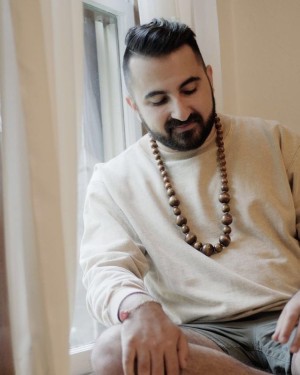The translation of the Arabic pieces in this magazine was a collaborative effort. Most often, the author wrote a rough English translation that I edited and later passed on for review with other native Arabic speakers. There are certain choices I made in this process that are worth mentioning. First is tense. In English, the root of any verb is its present tense, “to be,to do, to have.” However, in Arabic, the root is in the past tense. This is particularly relevant for Shams’ piece (p 84), as in Arabic, it is in past tense but the translation is in the present tense. Using the root form of the verb without any conjugations simplifies the poem in both languages.
The second choice (or really set of choices) is around poetic meaning versus literal translation. This is particularly clear in Hiba’s second piece: for the verse “I will dock in the harbour of your heart without papers,” the literal translation would replace “papers” with “Visa,” which is a rigidword and carries little poetic resonance in English. Wherever necessary, I leaned into the poetic translation as opposed to the literal meaning.
I also want to comment on the word “homeland.” There is no real equivalent to the original word in Arabic, “Watan.” The literal translation is “nation.” However, the concept of Watan can refer to land, nation and country. For example, I may not identify with the country of Syria, but I do identify with Syria as my place of origin, and in that sense Syria is my Watan. Ultimately, I chose the compound word “homeland” as it does not carry with it complicated politics into English, and offers insight into the Arabic concept.
Translation is a difficult and time-consuming process, and by no means am I qualified to do this work professionally. We have discussed hiring professional translators for future issues. If there are mistakes or confusing sentences, please blame it on me, or as we say in Arabic, plant it in my beard.

